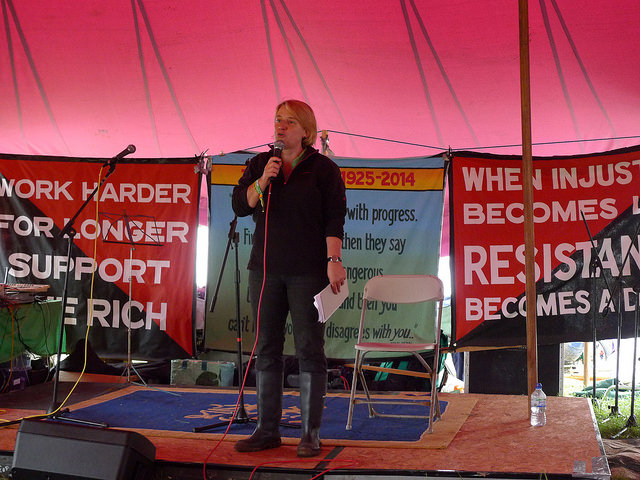The emergence of a genuine system of multiparty politics in the United Kingdom is a positive development for British democracy
In 1955 more than 90% of voters opted to back either Labour or the Conservatives. In 2015, this figure could drop to its lowest ever, even lower than 2010 when only 65% backed the established parties. Many factors lie behind this trend, but it represents a positive development, argues Vittorio Trevitt.
An intriguing development that has taken shape in British politics over the past decade has been the gradual emergence of what one might call a genuine system of multiparty politics, with minor parties tapping into discontent with mainstream politics and attracting ever-increasing levels of support at the expense of the traditional governing parties in Westminster. This trend arguably began back in 2010, when Labour and the Conservatives (long the key players in Britain’s two-party system) witnessed their combined share of the vote fall to an historic low of 65.1% and the Liberal Democrats holding the balance of power, allowing it to become a partner in government.
Although Nick Clegg has lamented the “painful compromises” that his party has made in office, the fact that the Lib Dems have been able to exert a degree of influence over governmental decisions shows how minor parties have finally broken the mould of two-party politics in Britain and, with the rise in popular support for UKIP, the Greens, and the SNP, will undoubtedly play a key role in shaping the outcome of the May general election.
Although various observers have expressed concern over this development, arguing that the erosion of the traditional two-party system could lead to political instability and weak governments, I believe that such a development should be welcomed by those who wish to see higher levels of public participation in the democratic process. The emergence of a genuine multiparty system has the potential to encourage a higher electoral turnout, as voters become aware of parties that they feel represent their interests better than Labour or the Conservatives (a sentiment that UKIP has capitalised on amongst previous supporters of both parties), and believe could effectively address their everyday concerns if elected to Westminster.
Another benefit of a genuine system of multiparty politics is that it could lead to minor parties bringing original and innovative policy proposals to the fore, while using their growing parliamentary strength to have their ideas enshrined in government legislation. In a number of traditional two-party democracies, such a development has already occurred. In New Zealand, the growing bargaining power of minor parties since the early Nineties has meant that the two main parties, Labour and National, have often had to form coalitions with other parties as a means of attaining power. This arrangement has enabled smaller parties to shape core government policies, as in the case of the Alliance party, Labour’s coalition ally from 1999 to 2008, which used its position to influence key reforms in areas like banking, parental leave, and social housing. The record of Alliance not only demonstrates the extent to which minor parties can use their influence to see their ideas put into practice, but also how they can bring positive changes to people’s lives.
In Britain, the emergence of genuine multi-party politics has been characterised by the remarkable growth of parties like UKIP and the Greens. Although standing on opposite sides of the political spectrum, the increased levels of support accumulated by both parties is indicative of the extent to which people are tired of the traditional two-party system and wish to see the spread of fresh new ideas within the walls of Westminster. On the Right, UKIP could find itself in the position of propping up a minority Conservative administration if the latter agrees to let them have a say over issues close to the party’s core like welfare and taxation. With many polls predicting that UKIP could win well over 10% of the vote, the prospect of an alliance between UKIP and the Conservatives should not be easily dismissed.
On the Left, the Greens have seen a similar surge in popular support, with around 10% of respondents in polls expressing interest in voting for the party (compared with the 1% of the vote it attained back in 2010), and a growing membership which has made it the fourth largest UK-wide party by number of members. Such a groundswell of support can be attributed to the strong appeal that the Greens have to those tired of the government’s austerity programme, providing a platform for many who wish to see a more egalitarian policy agenda pursued by a future Westminster government. With proposals of an advanced progressive nature such as a tax on wealth and a basic income for all citizens, the Green Party does indeed offer a clear choice for voters. The Greens could win enough parliamentary seats to deprive Labour of an overall majority should it win the most votes in May, and could indeed have to rely on the support of the Greens to form an administration in exchange for the latter having an important policymaking role, enabling it to see at least the partial fulfilment of its policy agenda in the next parliament.
Another party that could determine both the composition and agenda of the next administration is the Scottish National Party, with polls suggesting that Scotland’s governing party could increase its representation in Westminster from 6 to 43 MPs. This electoral avalanche would be at the expense of Labour, which is expected to lose 29 out of its 41 Scottish seats, possibly diminishing the prospect of Ed Miliband becoming prime minister. There are, nevertheless, signs that both parties could work closely together in parliament if Labour wins a plurality of seats, despite Miliband recently ruling out a possible coalition with the Scottish Nationalists. SNP leader Nicola Sturgeon has voiced her support for the idea of working with a Labour government “on a case-by-case basis,” on condition that it raises levels of public expenditure by at least 0.5% in real terms each year.
With recent findings by the Institute for Fiscal Studies suggesting that Labour in office could boost public spending by the amount proposed by the SNP while also achieving a current budget balance by 2019/20, this would give the SNP a good deal of leverage over social and economic policy decisions if Labour finds itself having to rely on the goodwill of the Scottish Nationalists to form a stable government in the event of another hung parliament. With both parties committed to the principles of social democracy and critical of the Coalition’s continued emphasis on austerity, a Labour-SNP coalition could prove itself to be an effective and durable one if both parties put aside their differences for the sake of building a fairer Britain.
The emergence of a genuine system of multiparty politics in the United Kingdom is a development that has been a long time in coming. As minor parties continue to increase their parliamentary strength and gain more leverage over the legislative process, people will see that voting for parties other than the traditional governing parties can make a difference, and that their votes are not wasted ones. Such a realisation not only has the potential to restore people’s faith in political institutions, but to encourage them to get more involved in grassroots politics and practice one of their basic rights as citizens: the right to vote. The emergence (and possible entrenching) of a genuine multiparty democracy in Britain is therefore something that democrats should celebrate, and is a development that could very well mark the dawn of an exciting new era in British politics.
—
Note: this post represents the views of the author and not those of Democratic Audit or the LSE. Please read our comments policy before posting.
—
 Vittorio Trevitt is a freelance Researcher with a research interest in local and national politics.
Vittorio Trevitt is a freelance Researcher with a research interest in local and national politics.






 Democratic Audit's core funding is provided by the Joseph Rowntree Charitable Trust. Additional funding is provided by the London School of Economics.
Democratic Audit's core funding is provided by the Joseph Rowntree Charitable Trust. Additional funding is provided by the London School of Economics.
The emergence of a genuine system of multiparty politics in the United Kingdom is a positive development for Briti… https://t.co/M8CDonCj7p
The emergence of a genuine system of multiparty politics is a positive development for British democracy https://t.co/BeCKuhftKX
“On the Left, the Greens have seen a similar surge in popular support, with around 10% of respondents in polls… https://t.co/vL1AE1SbLs
Genuine multiparty politics in the UK is a positive development for British democracy https://t.co/Q03QF8Wvpy HT @democraticaudit
Wishful thinking / mythology. The only parties that can ever wield any real power in the current system are Labour and the Tories. This is true even in the age of coalitions as they are always each ensured several times as many seats each as their nearest rival under FPTP. If coalition were about compromise, as it should be, junior partners would have considerable sway. But it isn’t, in the UK it is about numbers and the party / government whip (toe the line or else). So junior partners are always going to be subordinate to whichever of the big two is calling the shots. How is that anything other than a two party system simply paying lip service to smaller parties and nothing else? It’s still very much a two party system and will be until the voting system is changed. But neither of the two parties that call the shots have anything to gain by changing the voting system. And all the while enough people are consenting by voting and given them a mandate to govern, they can always claim that the current system is ‘democratic enough’ and ‘works just fine’. This is why campaigning for PR or any other desirable but not absolutely essential reform is a complete waste of time.
What all reformists should be doing, rather than campaigning for unachievable reforms or hoping against hope (and all evidence) that the two party system number is up, is campaigning for the one electoral reform that is actually achievable on account of it being a democratic pre-requisite that cannot be argued against without arguing against democracy itself, once properly understood. With enough widespread understanding of that fact, it would become inevitable, just as votes for women and the NHS before it. From there, the playing field will have been leveled enough to make further democratic reform that much more likely. Without this first step, no other reform is remotely likely in the current paradigm. That logical starting point for reform is #NoneOfTheAbove. You can get involved by signing our petition here: https://you.38degrees.org.uk/petitions/inclusion-of-an-official-none-of-the-above-option-for-all-uk-elections-2
The emergence of a genuine system of multiparty politics in the United Kingdom is a positive development for… https://t.co/8THnfyfoGG